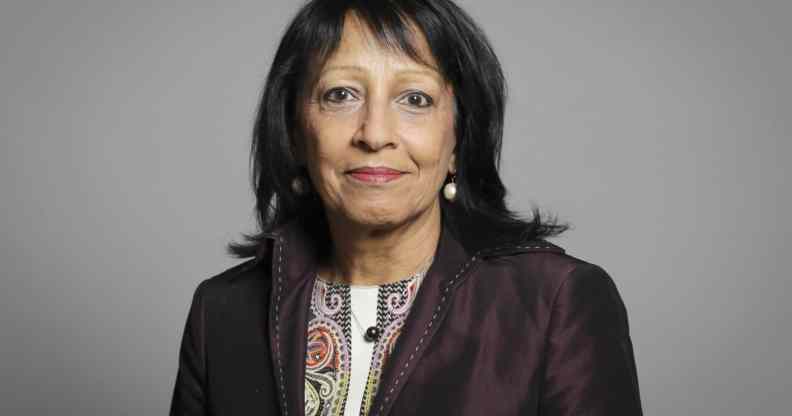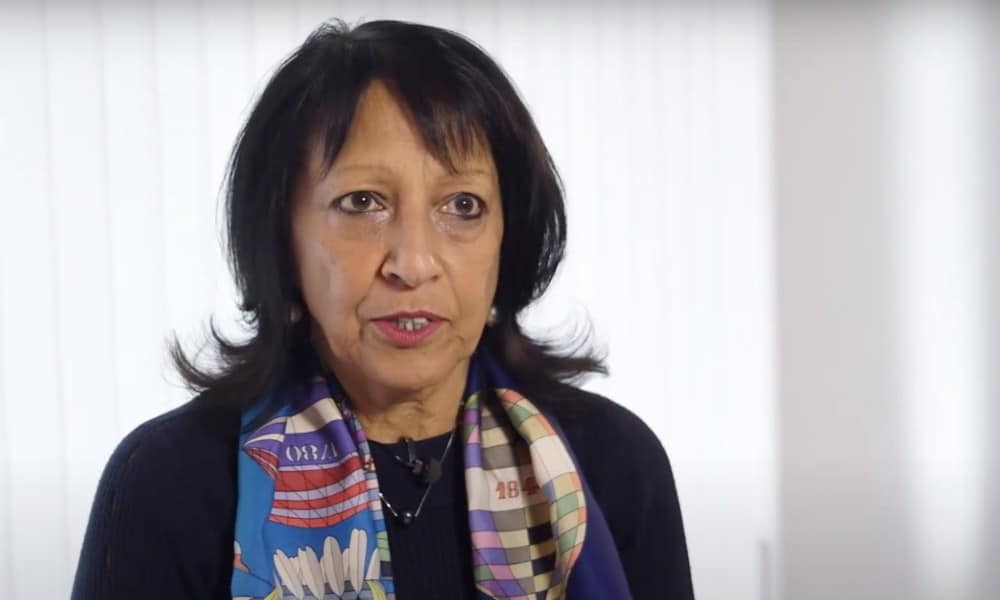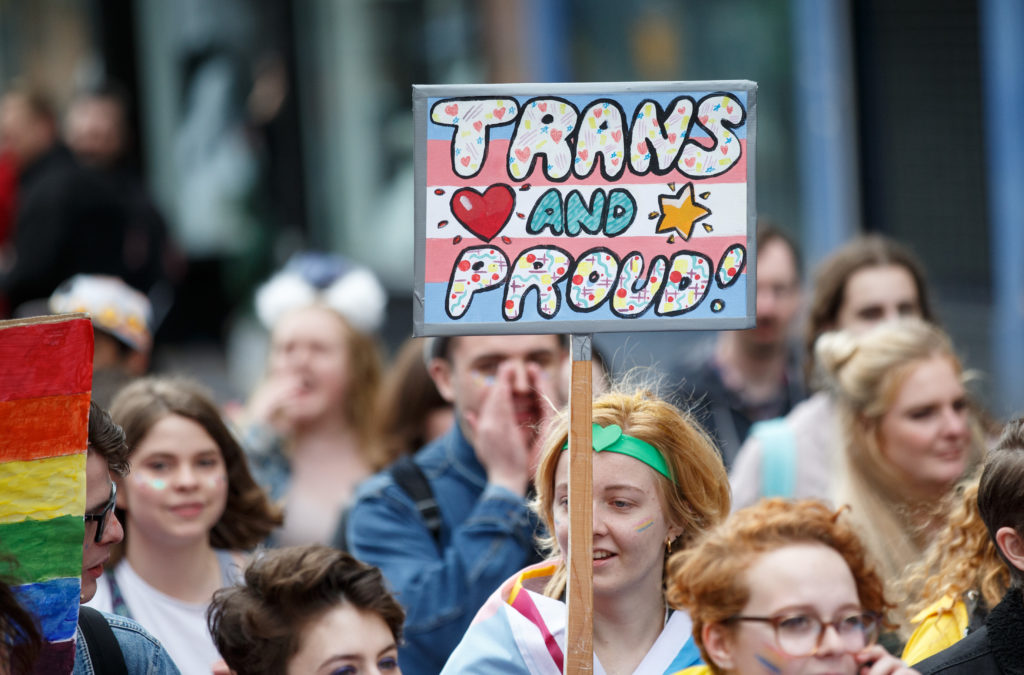UK equality watchdog slammed for telling Scotland to delay gender law reform

Chairwoman of the Equality and Human Rights Commission (EHRC),Baroness Kishwer Falkner. (Parliament)
Britain’s Equality and Human Rights Commission (EHRC) is being widely criticised for urging Scotland to pause vital trans rights reforms.
On Wednesday (26 January), the EHRC – a government-sponsored equality watchdog – published responses to Scotland’s planned Gender Recognition Act (GRA) reforms and Britain’s planned conversion therapy ban. Both replies have been furiously denounced by LGBT+ activists.
Scottish ministers hope to reform the GRA to make it easier for trans people to change their legal gender, after similar reforms in England and Wales were ditched by the Tory government.
It’s a simple request that has spurred vitriol from a small cadre of conservative, “gender critical” lawmakers and anti-trans campaigners.
EHRC chair Baroness Kishwer Falkner is apparently concerned by the “polarised debate” on trans rights “causing… distress to people on all sides”.
In a public email to Shona Robison, Scotland’s social justice secretary, Falkner argued “more detailed consideration is needed” before reforms can go ahead.
This is despite the Scottish government already conducting two lengthy and robust consultations on GRA reform plans, with the vast majority supporting the introduction of a simplified system.
“Like you, we are concerned at the polarised debate on this issue. It is causing much distress to people on all sides,” Falkner wrote.
“We want to work with you and other interested parties to support a careful and respectful discussion of potential changes to the law.”

Baroness Kishwer Falkner, chair of the Equalities and Human Rights Commission. (YouTube/UBS Centre)
Falkner noted that “some lawyers, academics, data users and others” have argued against simplifying the gender recognition process.
“These concerns centre on the potential consequences for individuals and society of extending the ability to change legal sex from a small defined group, who have demonstrated their commitment and ability to live in their acquired gender, to a wider group who identify as the opposite gender at a given point,” she wrote.
“The potential consequences include those relating to the collection and use of data, participation and drug testing in competitive sport, measures to address barriers facing women, and practices within the criminal justice system, inter alia.”
Falkner noted that “many trans people have criticised the current process to obtain a GRC as being intrusive, medically-based, bureaucratic, expensive and lengthy”, and said that the EHRC is concerned by spiralling wait times at gender identity clinics – “in some cases over five years for an initial appointment”.
However, the EHRC chief added: “We otherwise consider that the established legal concept of sex, together with the existing protections from gender reassignment discrimination for trans people and the ability for them to obtain legal recognition of their gender, collectively provide the correct balanced legal framework that protects everyone.
“This includes protecting trans people from discrimination and harassment, and safeguarding their human rights. Our focus is on continuing to seek opportunities to use our powers to support litigation to protect trans people’s rights.”
Furious activists left to wonder: ‘How long is long enough?’
LGBT+ charities and activists denounced the EHRC intervention, with Stonewall calling out the “attack on trans equality”.
“We are deeply troubled by the approach that the EHRC is taking to trans people’s human rights,” the charity said in a statement.
“Their approach appears to focus on pleasing a noisy minority of anti-trans activists, rather than promoting human rights for all LGBTQ+ people.”
“Stonewall calls on the UN Office of the High Commissioner for Human Rights and the Global Alliance of National Human Rights Institutions to urgently review EHRC and ensure that trans people’s rights are effectively supported by this institution.”
Vic Valentine of the Equality Network, a national LGBT+ organisation in Scotland, questioned the EHRC stance that the reforms require further review.
“Reform of gender recognition is one of the most consulted-on policies of all time, with two comprehensive public consultations by the Scottish Government since 2017,” Valentine said in a statement to the press.

A participant holds a sign saying “Trans and Proud” during the Glasgow Pride. (Robert Perry/Getty Images)
“The draft bill was fully consulted on a year ago, and everyone had their say. The EHRC itself responded to both public consultations, supporting reform.
“There will of course be much more detailed consideration of the bill as it goes through the Scottish Parliament.”
The charity Gendered Intelligence said in a statement: “How much longer can we consider? We have been waiting five years and two consultations for the government to fulfil its promises. How long is long enough?”
“Every delay sends a message: transgender people don’t count, transgender people aren’t valued, transgender people don’t deserve rights.
“Every postponement brings another wave of harassment and discrimination, fuelled by a government who refuse to support the marginalised and the vulnerable.”
In response to seething criticism, the EHRC said on Twitter Wednesday evening: “The current polarised debate is causing much harm and distress to people on all sides.
“Everyone’s concerns should be discussed and addressed carefully, openly and with respect, to avoid further damage and division.
In light of the concerns raised since proposals to reform the Gender Recognition Act were consulted on, we have come to the view that further consideration is needed before any change to the law should be made. (2/5)
— EHRC (@EHRC) January 26, 2022
“In light of the concerns raised since proposals to reform the Gender Recognition Act were consulted on, we have come to the view that further consideration is needed before any change to the law should be made.
“But we continue to call strongly for improvements to how it is implemented in practice, including far more and far faster services for people with gender dysphoria.”
Gendered Intelligence added: “The EHRC as they stand do not represent the people, and they do not represent the future.
“We can see proper legal recognition for trans and non-binary people and a total ban on the torture of conversion practices in our time.
“We can, and will, win this together.”
In her letter, Falker said she would write to the Scottish government soon with an update on “forthcoming guidance for single-sex service providers”.
Falkner was appointed as chair fo the EHRC in November 2020 by equalities minister Liz Truss.
In her first interview in the post, she suggested it is “entirely reasonable” to question trans people’s identity, a protected characteristic under the Equality Act 2010, and that cis women with “gender critical” views should be able to express them without facing “abuse”.

